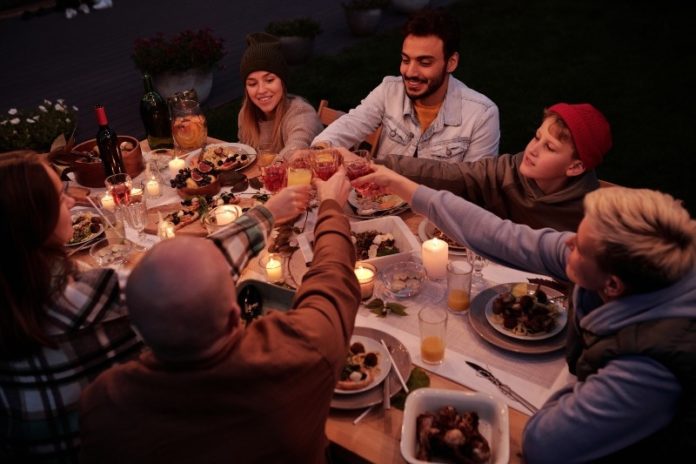
With COVID-19 numbers going up drastically, the CDC offers a number of suggestions on how to be safe and careful not to contract the disease in December over the holiday season.
This year has been stressful and isolating for everyone, but while this is customarily a season to be shared with family and friends, it is important to continue to be wary of community spread. It is more important than ever to modify regular holiday plans to reduce the continued spread of COVID-19 to keep yourself, your family, your friends, and your community safe and healthy.
How to Shop Safe and Buy Local
If you shop local, according to fundera.com, $68 out of every $100 stays in the local economy, however spending the same amount at a non-local business like a national chain only generates $43. Online shopping takes it almost all away.
Shopping local is good for the economy, and most local stores are working hard to make it easy to buy from them with minimal to no interaction. Many smaller retailers are willing to do the shopping for you so all you have to do is drive to the store and they will put your purchases in the trunk. No contact. Or they will mail gifts to your recipients. Other stores have created online shopping like the big boys. Some use Facebook.
Those who want to shop in-store should wear a mask and keep following the social distancing guidelines.
Celebrate the Holidays Virtually or with Your Household Only
The CDC says that if you are going to celebrate with others for Christmas, it is best to do it virtually or with members of your own household who are consistently taking measures to reduce the spread of COVID-19 like wearing masks, staying away from large groups of people, washing your hands, and keeping six feet between you and others. A household refers to those who live with you in the same house or apartment, which can include family members and/or roommates.
People who do not currently live in your housing unit, such as college students who are returning home from school for the holidays, should be considered part of different households. In-person gatherings that bring together family members or friends from different households, including college students returning home, pose varying levels of risk depending on how well they have followed safety guidelines.
Plan ahead and ask guests to avoid contact with people outside of their households for 14 days before the gathering.
Treat pets as you would other human family members – do not let pets interact with people outside the household.
Wear a mask while preparing food for or serving food to others who don’t live in your household. Limit people going in and out of the areas where food is being prepared or handled, such as in the kitchen or around the grill, if possible.
Stay Outside, Masked and Six Feet Apart at Parties
Hosting a party outside is safer, but still make guests wear masks when not eating or drinking, and they must stay six feet apart at all times. Guest need to avoid hugs, handshakes, or any other form of touching.
Setting up under an open pop-up tent instead of one enclosed by four walls is safer. It offers more ventilation. If temperatures fall, consider leaving one or more sides open or rolling up the bottom 12 inches of each sidewall to enhance ventilation while still providing a wind break.
Encourage guests to avoid singing or shouting, especially indoors. Keep music levels down so people don’t have to shout or speak loudly to be heard.
Keep Your Home Disinfected
Clean and disinfect commonly touched surfaces using EPA-approved cleaners. Stock bathrooms with hand soap and single use towels. Keep commonly touched surfaces cleaned frequently. Use touchless garbage cans if available. Use gloves when removing garbage bags or handling and disposing of trash. Wash hands after removing gloves.
Do Not Go to Parties with Those Who Have COVID-19
If you have been invited to a party by someone who has tested positive, make sure that they have had a negative test before you go, and that everyone else in the household has tested negative. Do not host or attend gatherings with anyone who has COVID-19 or has been exposed to someone with COVID-19 in the last 14 days.
The CDC says not to host or participate in any in-person gatherings if you or anyone in your household has been diagnosed with COVID-19 and has met criteria for being safe around others, has symptoms of COVID-19, is waiting for a COVID-19 viral test result, or may have been exposed to someone with COVID-19 in the last 14 days, or anyone who is at increased risk of severe illness from COVID-19.
Those Who are Older or Have Health Issue Need to Stay Isolated
Older adults or those with medical conditions making them at more risk of sever forms of COVID-19, or those who live or work with someone who falls in this category should avoid in-person gatherings with people who do not live in their household.
Limit Travel, Especially on Public Transportation
Travel may increase your chance of getting and spreading COVID-19. Postponing travel and staying home is the best way to protect yourself and others this year. Airports, bus stations, train stations, public transport, gas stations, and rest stops are all places travelers can be exposed to the virus in the air and on surfaces.
For more in-depth information, visit CDC Holiday Guidelines.














